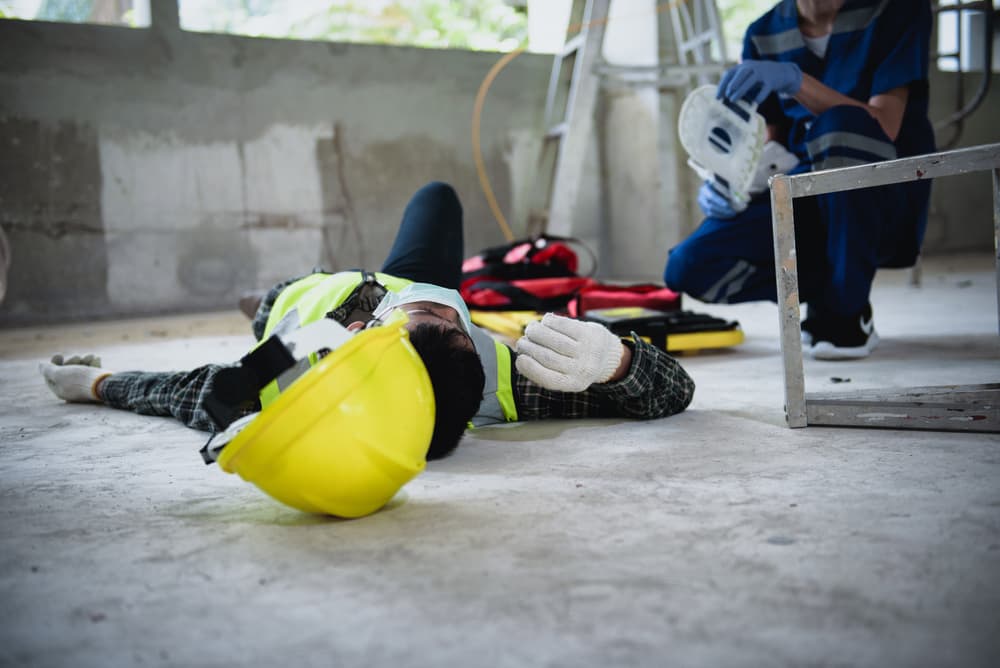What Can You Do After You Hit Your Head in a Construction Accident?

The numerous hazards on construction sites can lead to serious injuries. If you or someone you know sustained a head injury in a construction accident in Indiana, you must take immediate steps to avail yourself of your legal options.
This guide will cover what you should do after a head injury, your legal rights, how to navigate the claims process, and what to expect moving forward.
Schedule a Free Initial Consultation Today!
Immediate Steps to Take After the Accident
After a head injury:
Ensure Your Safety
The first priority after any accident is safety. If possible, move away from any potential hazards on the construction site. This might involve stepping back from heavy machinery or areas where other accidents could occur. Keep yourself and others safe, especially in a high-risk environment like construction.
Seek Medical Attention
While this guide focuses on legal matters, we cannot stress enough the importance of seeking medical attention. Even if you feel fine initially, get a medical evaluation, as head injuries can have delayed symptoms that worsen over time. Additionally, you need medical documentation for any legal claims you may pursue.
Report the Accident
After ensuring your safety and seeking medical care, notify your supervisor or site manager about the incident. You must report the accident under Indiana law. Failing to do so can complicate your claims later.
Make sure the report includes all relevant details, such as the time, location, and circumstances of the incident. You need a thorough report for any legal claims you may choose to pursue.
Gather Evidence
If you can do so safely, document the accident scene. This can include photographing the site, the equipment involved, and any visible hazards. Additionally, gather contact information from any witnesses present at the time of the accident. You need this evidence to pursue a legal claim.
Workers’ Compensation in Indiana
One of the first legal avenues to explore after a construction accident is workers’ compensation. In Indiana, most employers are required to carry workers’ compensation insurance. This program pays for medical expenses and lost wages due to work-related injuries, including head injuries.
With that said, here are the key features of workers’ compensation:
- No-Fault System: Workers’ compensation operates on a no-fault basis, meaning you do not need to prove negligence on the part of your employer to receive benefits.
- Coverage for Medical Expenses: Workers’ compensation typically covers all reasonable medical expenses related to your injury, including hospital bills, medications, and rehabilitation costs.
- Lost Wages: If your injury prevents you from working, you may receive wage replacement benefits. In Indiana, this usually amounts to two-thirds of your average weekly wage, subject to certain limits.
Filing a Workers’ Compensation Claim
To file a workers’ compensation claim in Indiana, follow these steps:
- Notify Your Employer: You must inform your employer about your injury within 30 days. You can do this through a verbal report followed by a written
 statement.
statement. - Complete the Claim Form: Your employer will provide you with a claim form. Ensure all information is complete and accurate. The form will ask for details about the accident, your injury, and any medical treatment you’ve received.
- Submit the Claim: After filling out the claim form, submit it to your employer’s insurance carrier. Keep a copy of the form for your records.
- Follow Up on Your Claim: Stay in communication with your employer and their insurance company to track the progress of your claim. You may need to provide additional documentation or attend medical evaluations.
Third-Party Claims
In addition to filing for workers’ compensation, you may pursue a third-party claim if another party’s negligence contributed to your injury.
This can occur when someone other than your employer is at fault, such as:
- A subcontractor on the site
- A manufacturer of defective equipment
- Property owners or site managers
Proving Negligence
To succeed in a third-party claim, you must demonstrate the other party’s negligence. This means showing that they failed to provide a safe working environment or acted in a way that directly led to your injury.
Here are the key elements you’ll need to prove:
- Duty of Care: Establish that the party had a duty to ensure a safe environment for workers.
- Breach of Duty: Show that the party failed to uphold that duty, including violating safety regulations or neglecting necessary maintenance.
- Causation: Connect the breach of duty directly to your injury. You will need to provide evidence that your head injury was a direct result of their negligence.
- Damages: Document the damages you suffered due to the injury, including medical expenses, lost wages, and any pain and suffering.
Gathering Evidence for Third-Party Claims
The evidence you gathered immediately after the accident in a third-party claim may include:
- Witness Statements: Collect statements from anyone who saw the incident occur. Their accounts can corroborate your version of events.
- Photographs: Visual evidence of the scene, including any safety violations or hazards, will strengthen your case.
- Reports and Documents: Gather any official reports made after the accident, including your employer’s incident report and OSHA investigations.
Dealing with Insurance Companies
After a construction accident, you’ll likely need to interact with your employer’s insurance company. Approach these communications with caution.
Insurance representatives may try to minimize your claim or offer a settlement that doesn’t cover your full expenses.
- Don’t Rush to Settle: Insurance companies often present initial offers that may seem appealing but fail to account for all your needs. Take your time to evaluate your situation and consult with legal counsel before accepting any offers.
- Document Everything: Keep detailed records of all communications with the insurance company. This includes phone calls, emails, and any documents exchanged. A paper trail can protect you if disputes arise later.
Seeking Legal Representation for Your Head Injury
Given the complexities of workers’ compensation and personal injury claims, seeking legal representation can be beneficial. While you can navigate the claims process on your own, having someone knowledgeable in construction accident laws can enhance your chances of a favorable outcome.
Consider seeking legal assistance if:
- Your injury is severe or has long-term implications.
- You are facing challenges with your employer or the insurance company.
- You believe a third party may be responsible for your injury.
A qualified attorney can help you understand your rights, evaluate your case, and guide you through the legal process.
Schedule a Free Initial Consultation Today!
Navigating the Claims Process
To prepare for your workers’ compensation or third-party claim:
- Gather Documentation: Collect all relevant medical records, accident reports, and correspondence with your employer and insurance company.
- Maintain a Journal: Keep a record of your recovery process, including how your injury affects your daily life. This can provide insight into your pain and suffering, which you need for any personal injury claim.
- Consult Medical Professionals: Regular check-ups and evaluations from healthcare providers will aid your recovery and serve as documentation for your claim.
Understanding the Timeline
The timeline for workers’ compensation claims can vary, but here are some general expectations:
- Initial Report: Notify your employer within 30 days.
- Claim Processing: After submitting your claim, the insurance company typically has 30 days to approve or deny it.
- Appeal Process: If your claim is denied, you can appeal the decision, which may take additional time.
For third-party claims, the timeline may increase as you gather evidence and negotiate with the other party’s insurance.
Common Challenges in the Claims Process
- Claim Denials: Insurers can deny claims for various reasons, including insufficient evidence or failure to report the injury on time. If your claim is denied, you can appeal the decision.
- Underestimating Your Damages: It’s easy to overlook certain damages, especially if you’re focused on immediate medical expenses. Consider all aspects, including long-term care, therapy, and emotional distress.
- Delayed Settlements: Insurance companies may delay settlement offers to see if your situation worsens or to pressure you into accepting a lower amount. Stay persistent and consult with legal counsel if necessary.
What to Expect During Recovery
After sustaining a head injury from a construction accident, you can count on us to take care of your legal claim. In the meantime, here are some things you can expect during the recovery process:
Physical Recovery
Recovering from a head injury can be a gradual process. Depending on the severity of your injury, you may experience various physical symptoms, such as headaches, dizziness, or fatigue. Follow your doctor’s recommendations and prioritize your health during this time.
Financial Recovery
Your financial situation may also be affected during your recovery. Workers’ compensation should provide some relief, but budget for any potential gaps in income or unexpected medical expenses.
Emotional Support
Don’t hesitate to reach out for support from family, friends, or professionals for help recovering from your injury. Counseling can help if you experience anxiety or depression related to your injury, and workers’ comp can pay for it.
Understanding Indiana OSHA Laws and Regulations
Occupational Safety and Health Administration (OSHA) regulations establish standards specifically for construction sites to ensure worker safety.
Familiarizing yourself with these regulations can help you identify any violations contributing to your injury.
Key OSHA Standards for Construction:
- Fall Protection: Employers must provide safety measures to prevent falls from heights, which are a leading cause of construction injuries.
- Scaffolding Safety: Scaffolding must be properly erected and maintained to ensure worker safety.
- Safety Training: Employers must provide safety training to employees, ensuring they understand how to work safely.
If your employer failed to comply with OSHA standards, this could strengthen your case for a third-party claim.
Statute of Limitations
In Indiana, the statute of limitations for personal injury claims, including third-party claims resulting from a construction accident, is generally two years from the date of the injury.
For workers’ compensation claims, you must report your injury within 30 days. If you miss these timelines, you may miss out on your right to compensation.
Moving Forward After a Construction Accident
Suffering a serious head injury can change your life moving forward. Here are some considerations to remember after your accident, and why you must file a claim. 
Evaluating Future Job Opportunities
Depending on the extent of your injury, you may need to reconsider your future in construction or the workforce entirely. If your head injury has lasting effects, you may need to consider physically demanding career paths.
Continuous Medical Evaluation
You will need regular medical evaluations as you navigate your recovery. These appointments can provide critical documentation for your claims and ensure you receive the care you need.
Keeping Informed About Your Rights
After your construction accident, stay informed about your rights. Knowledge can empower you to advocate for yourself effectively, whether it’s workers’ compensation, potential third-party claims, or workplace safety regulations.
Are You Ready to File a Legal Claim?
Hitting your head in a construction accident can affect your health, finances, and legal standing. By understanding the immediate steps to take, your rights, and the claims process, you can better navigate this challenging situation.
If you have questions or need assistance after a construction accident in Indiana, don’t hesitate to reach out. Understanding your options and taking proactive steps can ensure you receive the support and compensation you deserve.

